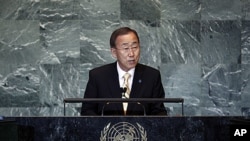United Nations Secretary General Ban Ki-moon is calling on Iran and the West to resolve the dispute over Iran's nuclear program through talks instead of military action.
A Ban spokesman said Thursday that diplomacy is the only way to settle the issue. Recent Israeli media reports say Israel has been considering a military strike on Iran's nuclear sites to stop what the West suspects is Iranian plans build nuclear weapons.
Iran's Supreme Leader Ayatollah Ali Khamenei said Thursday Iran will respond to any military strike by Israel or the United States with "iron fists."
U.S. Defense Secretary Leon Panetta says military action against Iran could have what he calls "unintended consequences. Panetta says striking at Iran would not deter its nuclear ambitions while having a serious impact on the region and on U.S. forces.
The International Atomic Energy Agency said this week it has "credible" evidence of Iranian efforts to design a nuclear weapon. Iran rejects the allegation and insists its nuclear program is peaceful. Iranian President Mahmoud Ahmadinejad says Wednesday Iran will not retreat "one iota" from its nuclear activities.
Israel responded to the IAEA by calling on the international community to stop Iran from gaining nuclear weapons and endangering world peace. Israel is widely believed to have the only nuclear arsenal in the Middle East. It sees a nuclear-armed Iran as a threat to its existence.
Britain, France, and Germany warns that Iran faces additional sanctions if it refuses to address international concerns about its nuclear work. But, Russia's foreign ministry said Thursday that Russian and Chinese diplomats agree that new sanctions "will not lead to the desired result" of resolving the Iranian nuclear dispute.
The U.N. Security Council has passed four sets of sanctions on Iran for refusing to stop nuclear activities that have both civilian and military uses.
Some information for this report was provided by AFP and AP.




